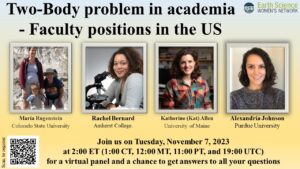The Two Body Problem in USA Academia
Are you considering applying for a faculty position in the USA this year? Facing a two-body problem? Worried if you should include this information in your application package, or during the interview?
The Earth Science Women’s Network will be hosting a webinar on November 7, 2023, at 2:00 pm Eastern Time (19:00 UTC) to answer all these questions and many others. A panel of assistant/associate professors within multiple earth science disciplines will share their experiences and “lessons learned”, and answer your questions. This workshop is geared towards graduate students and post-docs considering an academic career in the USA.
You can find the start time in your timezone here: https://www.timeanddate.com/worldclock/fixedtime.html?msg=ESWN+Free+Virtual+Event%3A+Two+Body+Problem+in+USA+Academia+&iso=20231107T19&p1=1440&ah=1&am=30
There will also be an opportunity to network with our speakers after the panel discussion. Register here: https://forms.gle/G5WCoQ7hkjKxK8se8
Hope to e-see you soon!
The ESWN Board and Associate Board of Directors
Speaker bios
Rachel Bernard – Assistant Professor, Department of Geology, Amherst College.
Dr. Rachel Bernard is an Assistant Professor in the Department of Geology at Amherst College. She earned a B.S.E. in Geological Engineering from Princeton University and a PhD in Geological Sciences from the University of Texas at Austin. Her research focuses on understanding the rheology of the Earth’s lower crust and upper mantle; that is, how rocks at these depths flow and deform. She is also passionate about bringing attention to the lack of diversity in the geosciences and working towards change.
Alexandria Johnson – Assistant Professor, Department of Earth, Atmospheric, and Planetary Sciences, Purdue University
Alexandria Johnson is an Assistant Professor in the Department of Earth, Atmospheric, and Planetary Sciences at Purdue University where her group studies cloud microphysics and the properties of clouds in atmospheres across the solar system and beyond. Alexandria and her husband have been navigating the dual career landscape for 15 years – from graduate school applications to postdoc offers and through a variety of faculty and research positions.
Katherine (Kat) Allen – Associate Professor, School of Earth and Climate Sciences, University of Maine
Kat leads a paleoceanography research group at UMaine and teaches courses in the School of Earth and Climate Sciences, where her spouse is also an associate professor. Her research involves sedimentology, stratigraphy, micropaleontology, geochemistry, and oceanographic field work. Her daughter just started kindergarten this fall.
Maria Rugenstein – Assistant Professor, Department of Atmospheric Science, Colorado State University
I’m a 4th year assistant professor in climate dynamics studying large-scale ocean-atmosphere interactions and the Earth’s radiation balance. I got my undergraduate and graduate degrees from ETH Zürich, Switzerland, with research visits to GFLD, Princeton and the Carnegie Institute for Global Biology at Stanford. I worked as a researcher in Utrecht, Netherlands and Hamburg, Germany before moving to the US. My partner is an assistant professor in Geochemistry and we have two kids, 2 and 5 years old.

